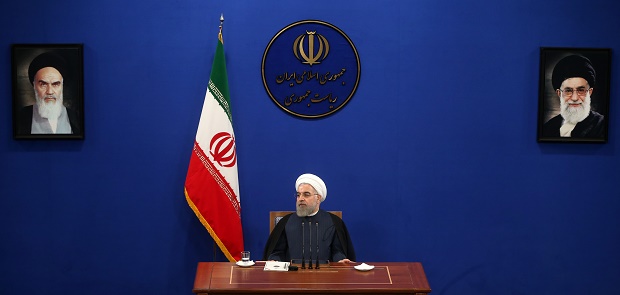
Iranian President Hassan Rouhani speaks during a press conference in Tehran, Iran, Saturday, Aug. 29, 2015. Rouhani said Saturday he opposed a parliamentary vote on the landmark nuclear deal reached with world powers, saying terms of the agreement will turn into legal obligation if it is passed by the house. Pictures of the late Iranian revolutionary founder Ayatollah Khomeini, left, and Supreme Leader Ayatollah Ali Khamenei, right, hang on the wall. AP
UNITED NATIONS — Iran’s Parliament speaker said Thursday he expects a heated debate among Iranian lawmakers before they vote on the nuclear deal between his country and six world powers in about a month.
Ali Larijani, formerly Iran’s top nuclear negotiator, predicted Iran’s debate would be even more dramatic than the one now taking place in the US Congress because of opposition from some lawmakers.
Iran’s President Hassan Rouhani said Saturday that he opposed a parliamentary vote on the agreement because its terms would turn into legal obligations if passed by Parliament.
Iran’s supreme leader Ayatollah Ali Khamenei, who traditionally has the final say on all important national matters, said Thursday that lawmakers representing the people should decide on the deal.
“I have no advice regarding the method of review, approval or rejection,” he said in remarks read on state television.
Larijani said that according to the Iranian constitution, the agreement needs to be discussed and approved by the Iranian Parliament.
He said that’s why a 15-member parliamentary committee is examining the deal, including its legality and the supervision and surveillance Iran will be under.
It will report to Parliament in a few weeks on its assessment, he said, “and I think Parliament will have to make its decision in about a month.”
Larijani told a briefing for invited reporters that he personally believes “this deal is a positive thing — a good thing,” but he wouldn’t predict the result when Parliament votes.
The agreement calls for limiting Iran’s nuclear program in exchange for lifting economic sanctions.
Iran insists its nuclear program is purely peaceful but the United States and Western nations believe Tehran’s goal has been to produce nuclear weapons.
Larijani again accused the United States of playing “the role of a bully” during negotiations.
He said Iranian parliamentarians have found “serious and major faults” with the agreement including a mechanism for UN sanctions to “snap back” in place if any of the six powers — the US, Russia, China, Britain, France or Germany — determines that Iran is failing to meet its obligations.
“For us, this is not possible,” Larijani said. “We cannot go back to the situation that we were in before the implementation of the agreement.”
For example, the agreement requires Iran to redesign its nearly built reactor at Arak so it can’t produce plutonium for nuclear weapons. But Larijani said “once you remove the core of the Arak reactor, you cannot put it back — this is impossible.”
Nonetheless, Larijani said Iran also achieved some of its goals including being able to enrich uranium inside the country, despite limitations and restrictions. “Another success for us was the lifting of sanctions,” he said.
RELATED STORIES
Iran’s Parliament speaker says he supports nuclear deal
White House clinches support for Iran nuclear deal